- bassoon
- Wilde
- Karl Fiorini
- Margaret Sutherland
- Ondine Records
- Martini
- Mahler: Symphony No 3
- Ignaz Brüll: Piano Concerto
Paths of Excellence
GIUSEPPE PENNISI reports via live stream on the Ravenna Festival Mozart/Da Ponte Trilogy
The most interesting opera performance, or rather the cycle of performances, of these months is the Mozart/Da Ponte 'trilogy', staged in Ravenna to celebrate ten years since the beginning of the autumn festival in the Adriatic city that has become the Italian Salzburg: Le nozze di Figaro, Don Giovanni and Così fan tutte. They are alternating on the stage of the Teatro Alighieri, evening after evening, from 31 October until 6 November 2022 in two cycles.
The cycle, the 'trilogy par excellence' of theatre in music, is produced in collaboration with two of the oldest theatres in Europe: the Swedish Drottningholms Slottsteater and the Opéra Royal de Versailles. In Italy it will be repeated at the Teatro Verdi in Salerno; one of the three operas, Don Giovanni, will also be staged at the Teatro Galli in Rimini. It is also revived in various prestigious European theaters (such as the Liceu in Barcelona and the Opéra Nationale de Bordeaux). To indicate the interest in this staging of the cycle, it suffices to say that in Ravenna, 25% of the seats were sold to foreign audience members weeks before the start of the performances - people came from all over Europe to enjoy it.
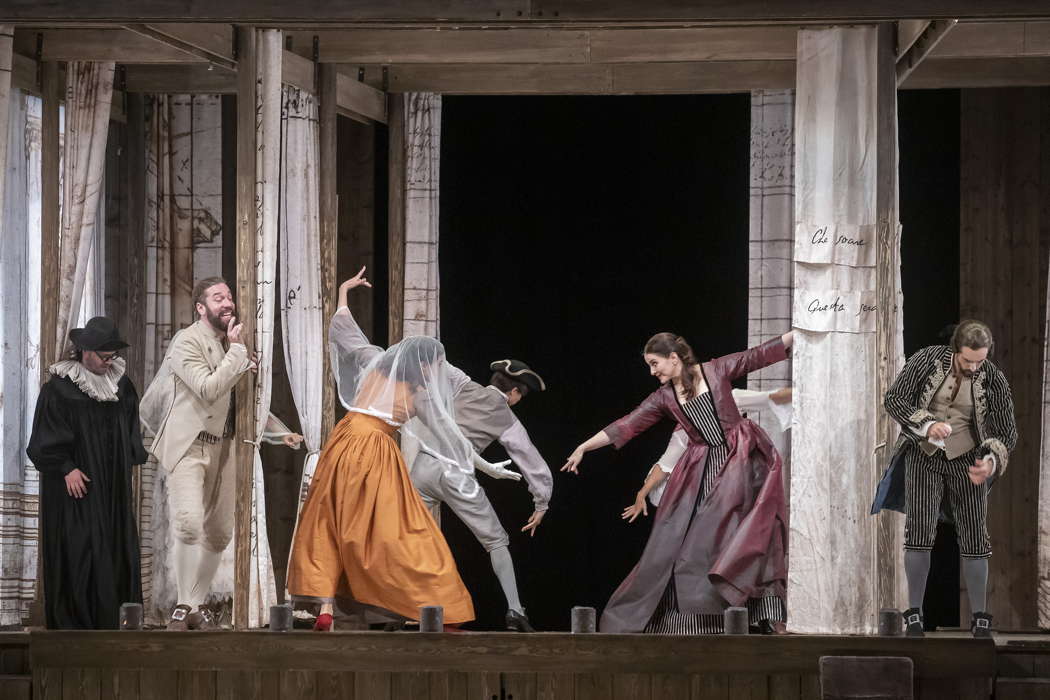
A scene from the Ravenna Autumn Trilogy Le nozze di Figaro. Photo © 2022 Fabrizio Zani
The director is Ivan Alexandre; sets and costumes were designed by Antoine Fontaine, who also took care of the lighting with Alexandre. 'They are different titles, but we bring them to the stage with aesthetic coherence', underlines Ivan Alexandre, who has signed works for the Vienna Staatsoper, the Palais Garnier and the Mozartwoche in Salzburg, 'telling the story of the same character: a libertine. We call him Cherubino in his youth, Don Giovanni in adulthood and finally Don Alfonso in old age. So the young man in love with all women – as he himself states in the first act of Le nozze di Figaro – becomes a heartthrob who, once aged, will push young people to replicate his vices of the past. It is as if a single heart beats in three different breasts, a "cycle of desire" in which each title can also exist in its own right but presenting the entire sequence, in addition to creating a coherent whole, gives a particular meaning to each of the three works. They are three moments of love life made with the same material, family dramas in which everyday life becomes an amazing adventure. We wanted to somehow return to the spontaneity of the traveling theaters of the past: make-up tables, silent servants and screens are scattered on stage. There are no wings, nothing is hanging in the air (except for some light), there are no trapdoors, only a few wooden structures and some sketches on mobile canvases.'
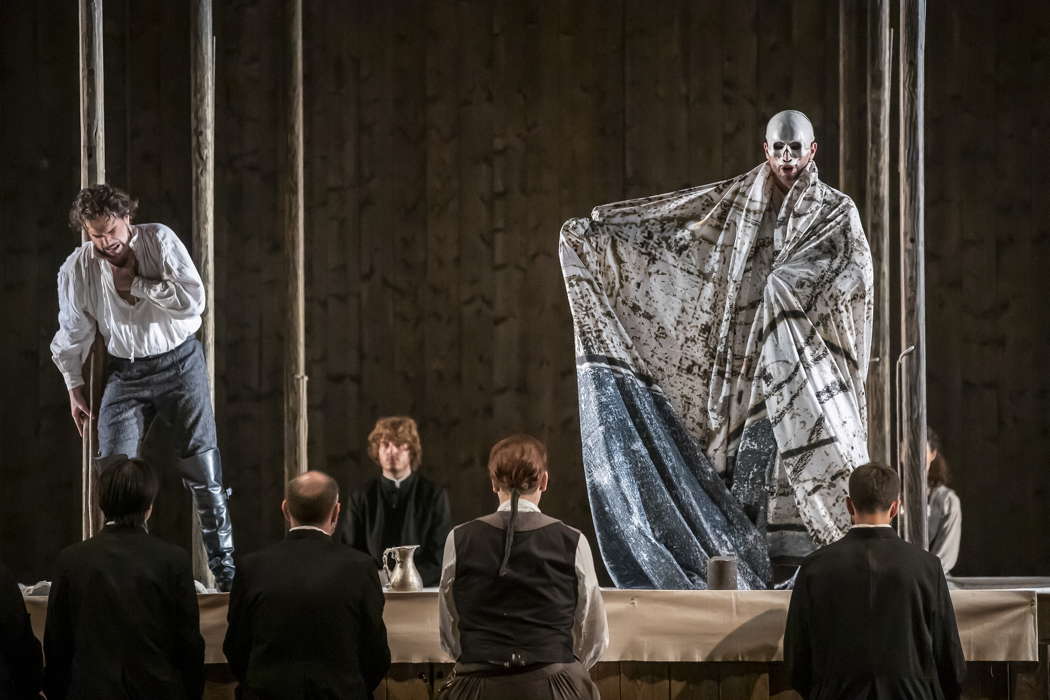
Christian Federici in the title role of Ravenna Autumn Trilogy's Don Giovanni. Photo © 2022 Fabrizio Zani
The staging of the three productions is not only a refined game that intertwines scene and offstage to celebrate the magnificent 'machine' of musical theater, but also a witty commentary on the different narrative devices that Mozart and Da Ponte employ. If in Le nozze di Figaro the scenography grows from Act to Act and the action takes place at the front of the stage, Don Giovanni, in the original 1787 Prague version because it's 'clearer, more natural and lively', is instead represented 'in perspective'. The hero occupies the foreground, while the other characters – the valet, the women, the rival, etc – always find themselves in the position of remaining one step behind the seducer. The protagonist looks over his shoulder only once, when he is seized by doubt for the first time in his life, for a few seconds, before disappearing. Finally, Così fan tutte has a circular pattern developed on two levels: the collective stage and a central stage. There, in turn, the young people are faithful and abandoned lovers; a game of parts, in fact, and roles that are reversed under the gaze of Don Alfonso, master of ceremonies.
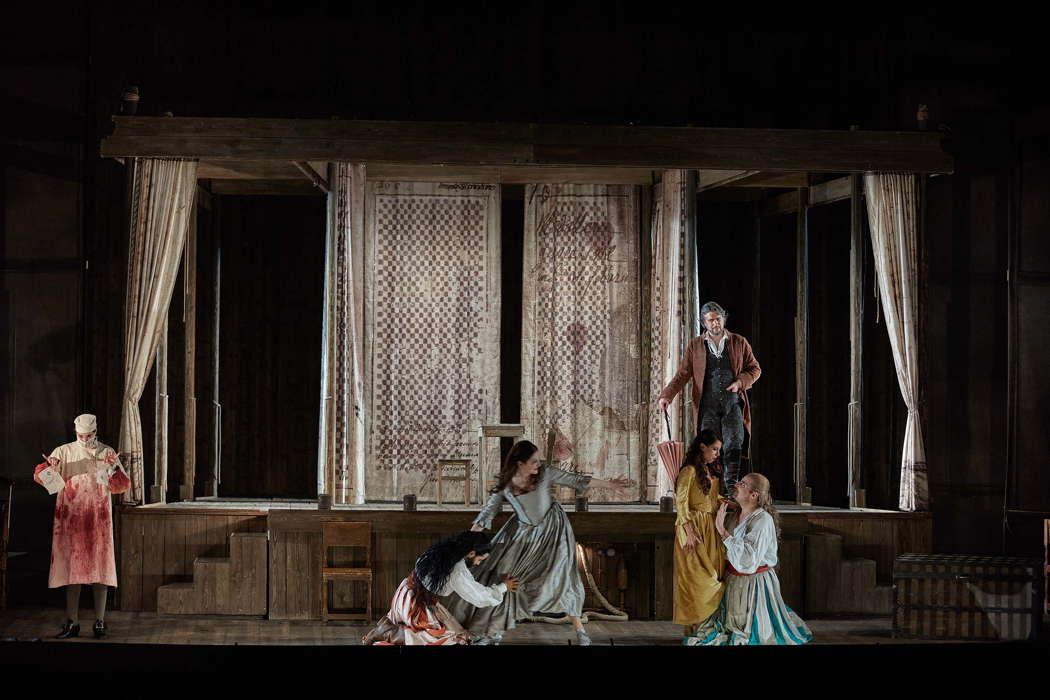
A scene from the Ravenna Autumn Trilogy Così fan tutte. Photo © 2022 Fabrizio Zani
On the podium of the Luigi Cherubini Youth Orchestra are Giovanni Conti, Erina Yashima and Tais Conte Renzetti, united by having been students of the Italian Opera Academy that Riccardo Muti created in 2015. The Academy’s aim is to transmit to the new generation of musicians, but also to the public, Muti's experience of the extraordinary heritage of Italian opera. Antonio Greco leads the Cherubini Choir and the 1685 Choir of the Istituto Superiore di Studi Musicali 'G Verdi' of Ravenna. All come from paths of excellence.
Erina Yashima, born in Germany to a Japanese family, participated in the first edition of the 'autumn cycle' of the Ravenna Festival and then she was Muti's assistant in Chicago, having won the prestigious scholarship named after Sir Georg Solti. After being assistant conductor of the Philadelphia Orchestra, she is now principal Kapellmeister at the Komische Oper in Berlin. The other two directors have been selected for the 2020 edition of the Academy. Giovanni Conti, originally from Varese, studied in Milan and Stuttgart, winning first prize at the 'CAMPUS dirigieren' competition among the best conducting students of the German conservatories. This season will see him take on the role of Kapellmeister of the theater of Krefeld-Mönchengladbach. Tais Conte Renzetti was, instead, born in Brazil and after studying in Vienna and Italy she was assistant to the Brazilian maestro Martinho Lutero de Galati as part of his musical association Rete Culturale Cantosospeso in Milan.
Over four acts, the story of Le nozze di Figaro develops (and twists) around the attempt of the Count of Almaviva, whose role is entrusted to the baritone Clemente Antonio Daliotti, to impose the ius primae noctis on Susanna (who has the unmistakable stamp of Arianna Vendittelli). She is the maid of the Countess (Ana Maria Labin, acclaimed Mozart interpreter) and betrothed of Robert Gleadow's Figaro, bass-baritone of Canadian origin). The Italian-French mezzo-soprano Lea Desandre plays the role of the unforgettable Cherubino. He is one of the main driving forces of the whirlwind of mocked husbands, shrewd ladies-in-waiting and nobles. The cast is completed by Manon Lamaison as Barbarina, Norman D Patzke as Bartolo and Antonio, Valentina Coladonato as Marcellina and Paco Garcia as Don Basilio and Don Curzio. At the fortepiano sits Lars Henrik Johansen, also involved for the other two titles.
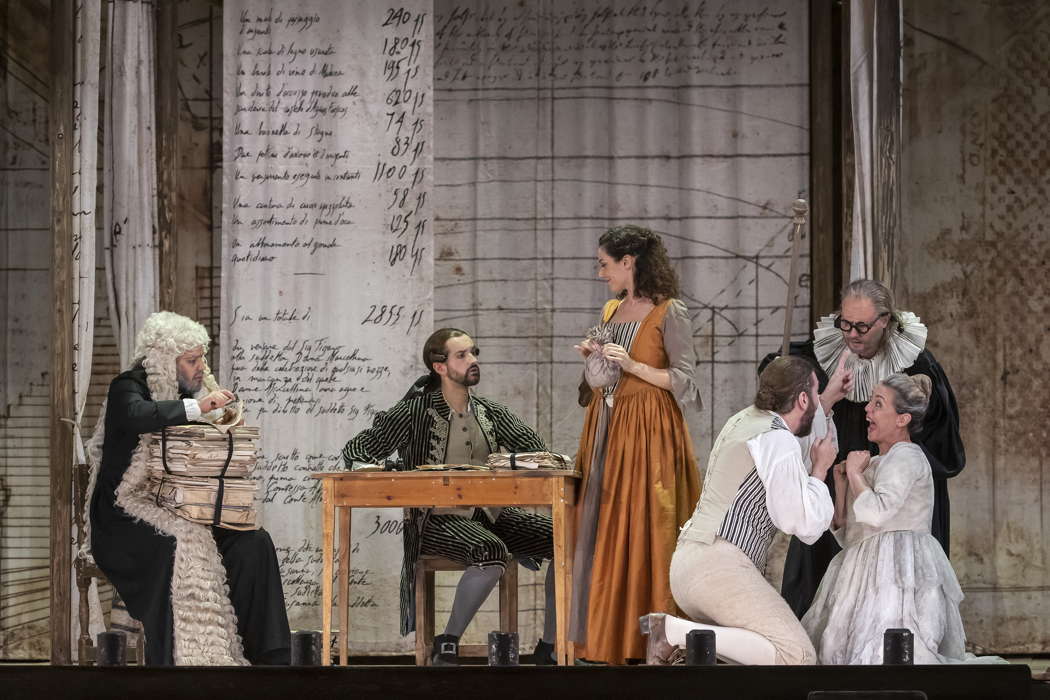
A scene from the Ravenna Autumn Trilogy Le nozze di Figaro. Photo © 2022 Fabrizio Zani
For Don Giovanni, Arianna Vendittelli and Robert Gleadow return to the stage as, respectively, Donna Elvira and the servant Leporello, while the eponymous protagonist is the baritone Christian Federici. His Don Giovanni tries to seduce with deception the Donna Anna performed by Iulia Maria Dan (promised to Don Ottavio staged by Julien Henric) and ends up killing her father in a duel, the Commander entrusted to the bass Callum Thorpe, who in England collaborates with the Royal Opera House, Glyndebourne and Opera North. In the spirit of the Commedia dell'Arte, which involves the alternation of interpreters in different roles, Thorpe also plays the farmer Masetto, while his wife Zerlina – also the object of Don Giovanni's ambitions – is Chiara Skerath. In this case, Antonio Greco leads the Luigi Cherubini Choir.
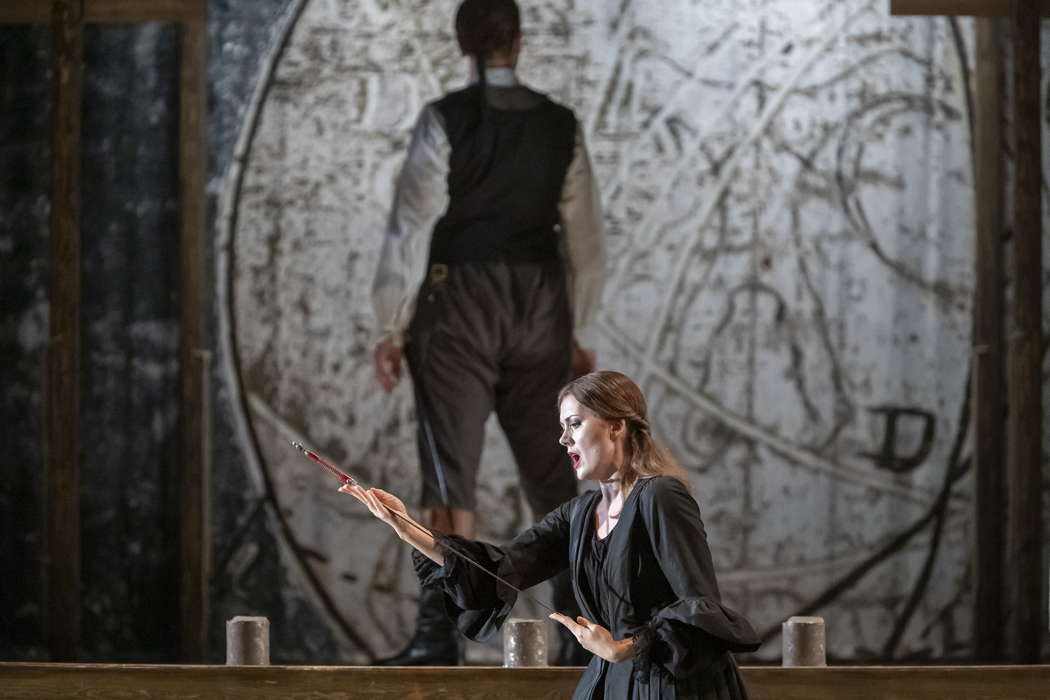
Iulia Maria Dan as Donna Anna in the Ravenna Autumn Trilogy Don Giovanni. Photo © 2022 Fabrizio Zani
The school of lovers referred to in the title of Così fan tutte has only one teacher: Don Alfonso, again Christian Federici, is the architect of the bet that turns into a cruel joke; his hilarious accomplice is the waitress Despina, mezzo-soprano Miriam Albano, for years soloist at Vienna State Opera. The young officers Guglielmo and Ferrando who bet on the fidelity of their girlfriends are Robert Gleadow and Anicio Zorzi Giustiniani, recently at the Ravenna Festival with the Byzantine Academy for Handel's Il Trionfo del Tempo e del Disinganno. Fiordiligi and Dorabella, who are seduced by each other's boyfriend, are instead Ana Maria Labin and Josè Maria Lo Monaco, who – like Vendittelli and Zorzi Giustiniani – made his debut at the Ravenna Festival some ten years ago within the project dedicated to the Neapolitan School.
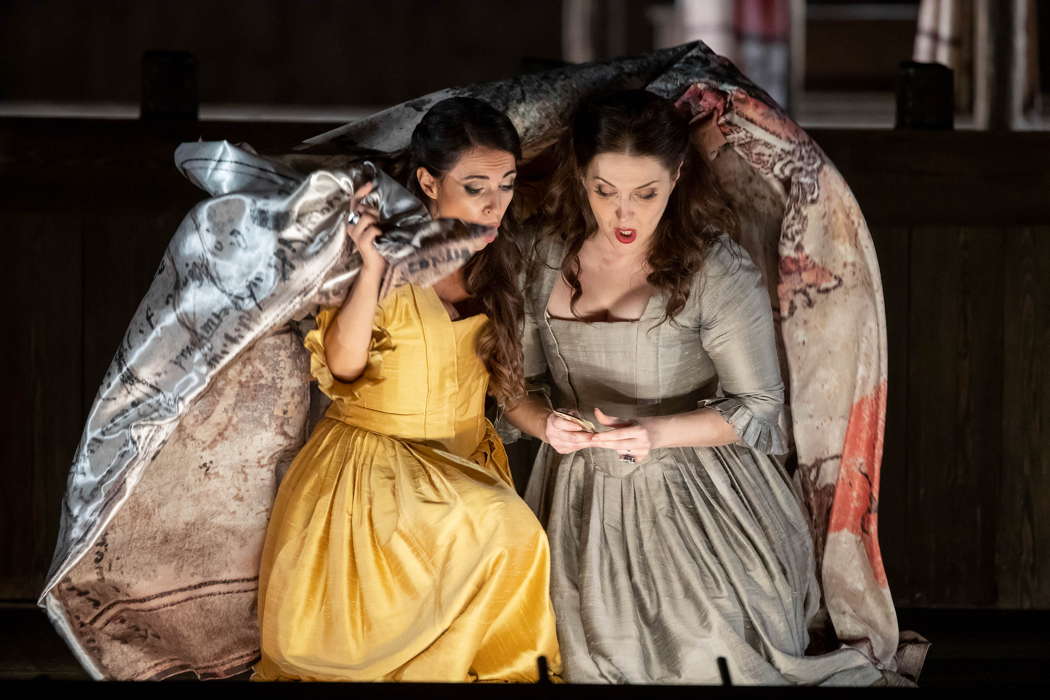
Josè Maria Lo Monaco as Dorabella and Ana Maria Labin as Fiordiligi in Ravenna Autumn Trilogy's Così fan tutte. Photo © 2022 Fabrizio Zani
There were accolades and ovations for this 'trilogy' of great quality. I hope that a DVD will also be produced.
Copyright © 5 November 2022
Giuseppe Pennisi,
Rome, Italy

ARTICLES ABOUT 'LE NOZZE DI FIGARO'
ARTICLES ABOUT 'COSÌ FAN TUTTE'




